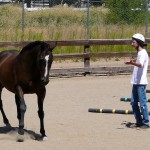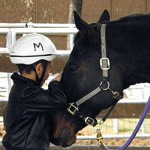We have discovered a couple of great little books written by David Niven, Ph.d. entitled “The 100 simple secrets of Happy People” and “The 100 simple secrets of Happy Families”. The most interesting thing about these “secrets” is that they are all based on research. We will post a weekly tip at the ranch and here for you to consider…
Forgiveness Depends on More Than the Apology
 From a foundation of trust and love, children accept and forgive mistakes we make. From a less solid foundation, children allow mistakes to stand for the whole. The key to being forgiven for the mistakes we will inevitably make is not a convincing and heartfelt apology – the key is always showing love, thus making it clear that a mistake is a mistake and not an indication of lack of interest.
From a foundation of trust and love, children accept and forgive mistakes we make. From a less solid foundation, children allow mistakes to stand for the whole. The key to being forgiven for the mistakes we will inevitably make is not a convincing and heartfelt apology – the key is always showing love, thus making it clear that a mistake is a mistake and not an indication of lack of interest.
The first thing that strikes me about this is that it  really is about all relationships, not just our relationship with our children. If we have come to doubt someone’s feelings for us, as demonstrated by how they treat us, every ‘mistake’ steals a little bit more of our faith in them and often in ourselves.
really is about all relationships, not just our relationship with our children. If we have come to doubt someone’s feelings for us, as demonstrated by how they treat us, every ‘mistake’ steals a little bit more of our faith in them and often in ourselves.
In our work with horses we teach about ‘levels of pressure’ and how this relates to trust. We will always ask nicely, but ultimately, we mean what we say  and there will be consequences (increased pressure) if our horse (or our child/teen/spouse) does not do as we have asked.
and there will be consequences (increased pressure) if our horse (or our child/teen/spouse) does not do as we have asked.
We like to use the example of curfew. If you know that you are supposed to be home at 10pm, but don’t come in till midnight and nothing (or little) happens, you quickly realize that there really isn’t a curfew. This lack of follow through can lead to questioning all kinds of things that parents tell children/teens.  On the other hand, if parents follow through and enforce some consequences for the transgression, your child/teen may think twice about not doing what you have asked them to do (or not to do).
On the other hand, if parents follow through and enforce some consequences for the transgression, your child/teen may think twice about not doing what you have asked them to do (or not to do).
This is true of horses as well. If we have been consistent in our work with them, they know what comes next if they do not do as they are asked.
 When we are able to count on someone, when we know that they mean what they say, we are able to overlook mistakes and accept apologies as genuine.
When we are able to count on someone, when we know that they mean what they say, we are able to overlook mistakes and accept apologies as genuine.
This is so true with horses. They appreciate when we communicate clearly. They can trust us. When we are sloppy or lazy or inconsistent with horses (as with people) they become anxious because they can’t trust us and do not know what to expect from us. With horses this also becomes a safety issue, since if something happens that makes them worried, and we do not have their trust, we will not be able to reassure them and help them overcome their fear.
So ultimately, being firm, fair and consistent in our communications and interactions, whether with horses or each other, leads to trust and respect.
For children, more than 80% of the basis for forgiving negative parental behavior is rooted in the pre-existing strength of the relationship rather than in the immediate aftermath of the behavior, such as the apology. Paleari, Regalia, and Finchman 2003
